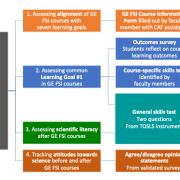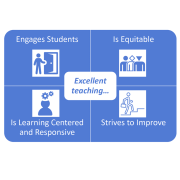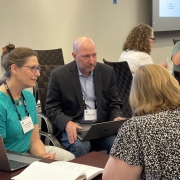Archive for year: 2023
Recent Publication Shares Framework and Results from CAT’s Assessment of the General Education Foundations of Scientific Inquiry (GE FSI) Program
/in GE FSI /by michelle chenThe Center for the Advancement of Teaching (CAT) developed a holistic assessment framework for UCLA’s General Education Foundations of Scientific Inquiry (GE FSI) courses. This comprehensive approach combines faculty engagement and student input to ensure the alignment of individual course outcomes with overall program objectives. CAT collaborated closely with faculty teaching GE FSI courses to identify course learning outcomes that align with the GE FSI program goals. Complementary to that process, CAT administered pre- and post-course surveys to students to gather information regarding students’ (1) course learning experiences, (2) scientific literacy skills, and (3) attitudes toward science after GE FSI courses. Instructors were also given the opportunity to consult with the team to learn more about how specific aspects of their learning outcomes, teaching practices, and course assignments impact student learning. An overview of the assessment plan and general outcomes were recently published in The Journal of General Education, which includes preliminary findings that showcase the benefits of a holistic approach for achieving a broad range of goals (as shown in the image below). The article is now available online and can be accessed via the following link.
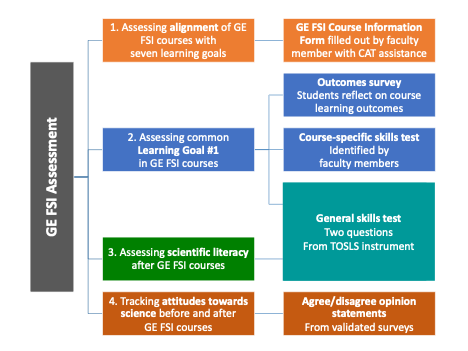
UCLA’s Holistic Evaluation of Teaching Program Congratulates Cohort 1, Welcomes Cohort 2
/in Evaluations /by michelle chen
The Center for the Advancement of Teaching is proud to congratulate our first cohort of departments engaged in the Holistic Evaluation of Teaching (HET) project. These departments have shown their commitment to equitable, student-centered teaching by working over the past academic year to draft unique approaches to teaching evaluation that reflect the priorities and context of their disciplines. CAT is excited to support these departments as they continue to refine their new approach and their faculty begin to try out the newly developed tools.
We’re in the process of recruiting departments to be part of our second cohort and will announce them soon! (Departments interested in being involved in HET should contact the project co-leads, Adrienne Lavine (lavine@seas.ucla.edu) and Glory Tobiason (tobiason@cresst.org).
UCLA’s Holistic Evaluation of Teaching Program Showcased at National Summit
/in Evaluations /by michelle chenRecently, Glory Tobiason (Research Scientist at CRESST and Clinical Faculty in Education) and Adrienne Lavine (Professor, Mechanical and Aerospace Engineering) attended the Teaching Evaluation Networking Summit. The Summit was convened by leaders of the TEval initiative, a national effort aimed at transforming the way teaching is evaluated in higher education. The invitation-only event took place June 7-9, and in attendance were ~40 representatives from ~20 colleges and universities in the US and Canada.
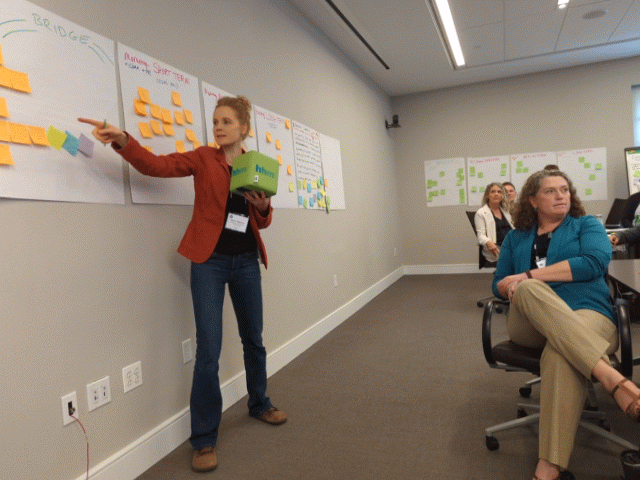 |
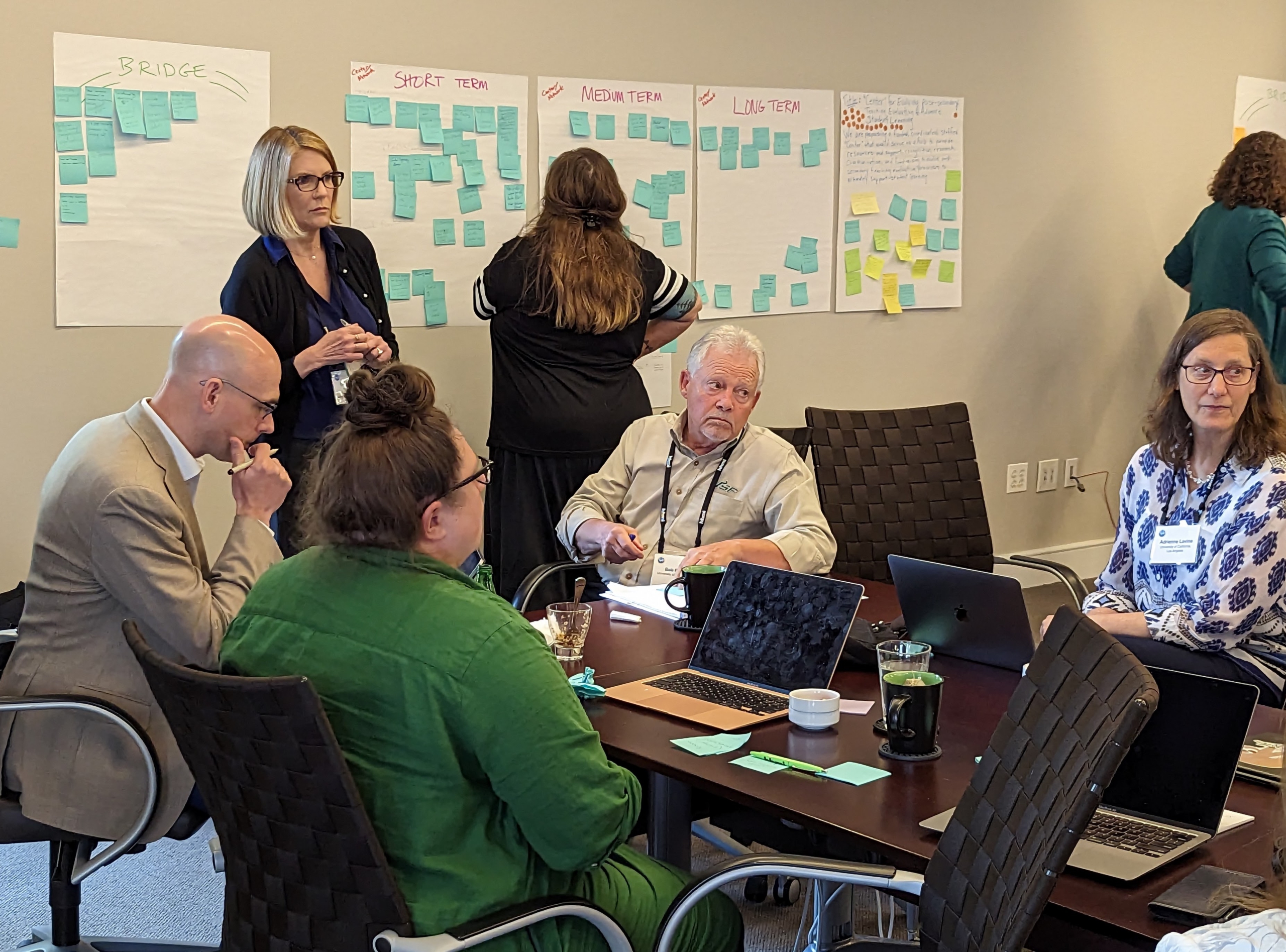 |
| Glory Tobiason presenting on Holistic Evaluation of Teaching | Adrienne Lavine, right, collaborating on Holistic Evaluation of Teaching |
In their role as representatives from UCLA, Drs. Lavine and Tobiason shared details of UCLA’s efforts to reform teaching evaluation, namely the Holistic Evaluation of Teaching (HET) initiative. The outcome of the Summit was a shared vision of a national center that would provide resources, consultation, research, and marketing around improved teaching evaluation in higher education.
Assessing the Impact of Diversity Instruction in STEM
/in Center for Educational Assessment /by michelle chenIn March of 2023, researchers from the Center for Educational Assessment (CEA), along with instructor Kirsten Turlo, prepared a poster for the American Association of Colleges and Universities (AAC&U) Conference on Diversity, Equity, and Student Success in Henderson, Nevada. The poster presented results from data collected over three quarters from a life science general education (GE) course that also meets the university diversity curriculum requirements. University diversity degree requirements are largely intended to change campus climate and increase cultural competency. CEA evaluated the effectiveness of instruction by examining student agreement on whether or not the course met the learning outcomes for the life science and diversity instructional units. Simultaneously, researchers assessed students’ attitudes about science and diversity before and after they completed the course. After each quarter, the instructor was given the results of the assessment, which were used to make changes to the course for subsequent quarters.
Pre-course attitudes about science were consistently and strongly positive, with small increases in positive responses upon course completion. For diversity attitudes, researchers found increased agreement with the statement, “a more diverse faculty would enhance my university” and “discriminatory practices still exist in American higher education because it has been institutionalized” from the pre- to post- course surveys. Moreover, between the Fall and Winter quarters, a lecture was added expressly addressing why course developers, Kirsten Turlo and Diana Rigueur, felt diversity content was critical. In the next quarter, there was an 11% decrease in agreement with the statement, “too much attention divides the campus community.” These findings suggest that continuously engaging with diversity content leads to greater shifts in positive attitudes toward diversity. Additionally, in all three quarters, students—whether or not they held positive attitudes toward diversity—overwhelmingly reported that the course achieved both the science and diversity learning outcomes.
Fostering Scientific Literacy Through Synthesis: the CREATE(S) Process
/in Center for Educational Assessment /by michelle chenResearchers in the Center for Educational Assessment, in collaboration with colleagues at UCLA, Kaiser Permanente Bernard J. Tyson School of Medicine, and Arizona State University, published a new study in the Journal of Microbiology and Biology Education’s special edition on Scientific Literacy.
This study examined the impact of the CREATE(S) process (Concept map the introduction, Read methods and results, Elucidate hypotheses, Analyze data, Think of the next Experiment, and Synthesis map), on students’ scientific literacy skills, specifically their understanding of the process of science and their ability to use narrative synthesis to communicate science. Analyses revealed that CREATES intervention students versus the comparison group demonstrated improved ability to interpret and communicate primary literature, especially in the methods, hypotheses, and narrative synthesis learning outcome categories. Through a mixed-methods analysis of a reflection assignment completed by the CREATES intervention group, students reported the synthesis map as the most frequently used step in the process and highly valuable to their learning. Taken together, the study demonstrates how this modified CREATES process can foster scientific literacy development and how it could this scaffolded approach can be applied in other Journal Club settings.
Figure: The adapted CREATE(S) Process
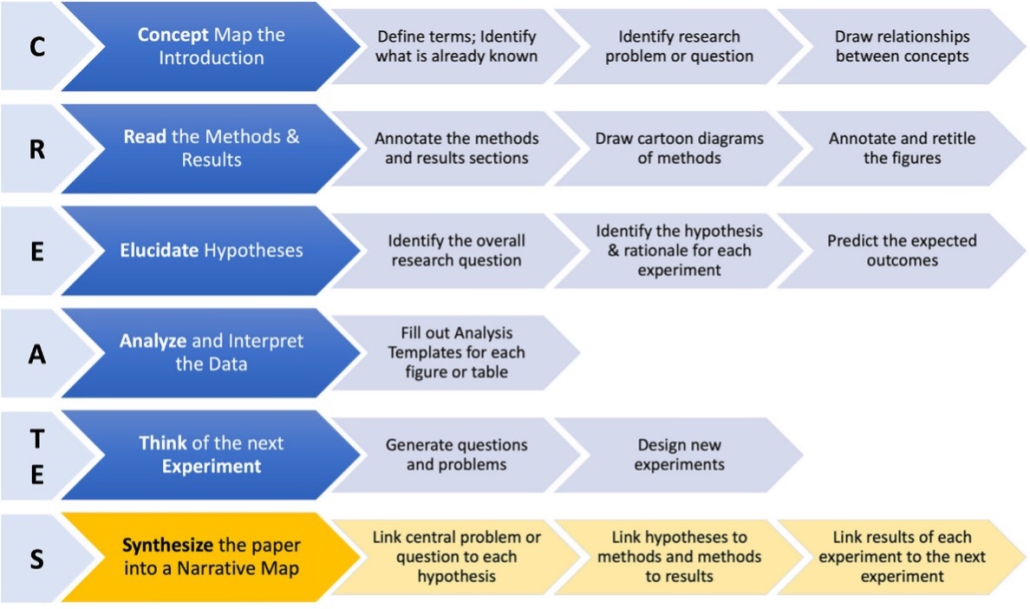
Citation: Goodwin, E. C., Shapiro, C., Freise, A. C., Toven-Lindsey, B., & Moberg Parker, J. (2023). Synthesizing Research Narratives to Reveal the Big Picture: a CREATE (S) Intervention Modified for Journal Club Improves Undergraduate Science Literacy. Journal of Microbiology & Biology Education, e00055-23. https://journals.asm.org/doi/10.1128/jmbe.00055-23
70 Powell Library
Box 951515
Los Angeles, CA 90095-1515



